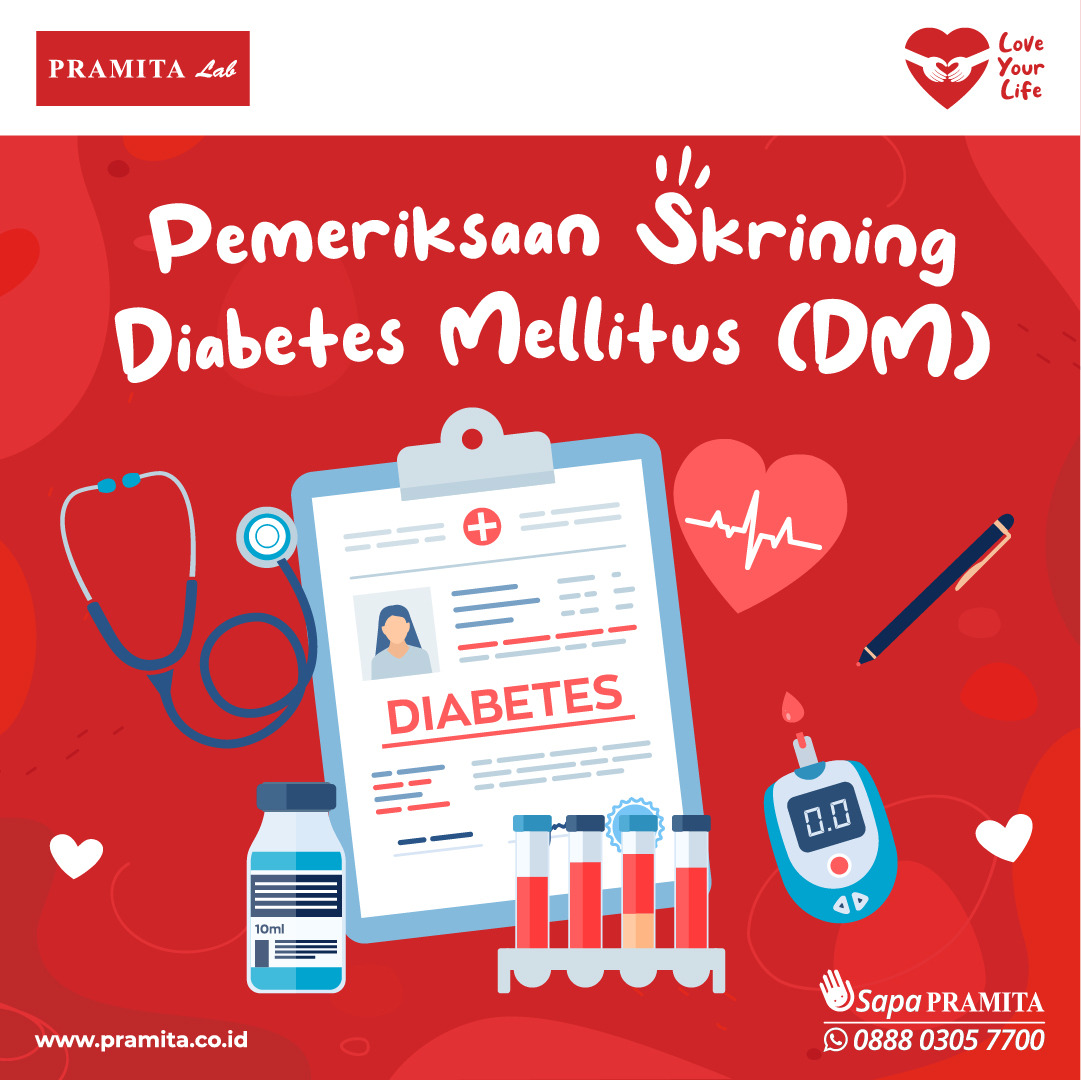Healthy Inspirations
Semua
Work Life
INFO PEMERIKSAAN
Parenting/Kesehatan Anak
LabPedia
Life Style
Kesehatan Wanita
Health Info
Millenial
Info Kesehatan
Mitos/Fakta

DIABETES MELLITUS SCREENING
Fri, 18 Nov 2022
Diabetes Mellitus, also known as diabetes or diabetes, is a chronic or long-term disease. This disease is characterized by an increase in blood sugar (glucose) levels above normal values. Diabetes occurs when the body has trouble taking sugar (glucose) from the blood into the cells and using it as energy. This condition ultimately results in a buildup of sugar levels in the bloodstream.
Diabetes Mellitus if not properly controlled can cause serious problems and complications, as well as cause damage to various other organs/tissues, such as: heart, kidneys, eyes and nerves.
Type 2 diabetes screening is part of routine health care, especially if a person is at high risk for diabetes. This screening can help identify type 2 diabetes at an early stage (prediabetes) and treat prediabetes early, and even prevent type 2 diabetes from occurring.
Who has a high risk of diabetes?
Factors a person is more susceptible to type 2 diabetes, caused by:
• Have a parent or sibling with diabetes
• Are overweight or obese
• Having a sedentary lifestyle and not getting enough exercise
• Age over 45 years
• Have a history of diabetes during pregnancy
• Having low levels of good cholesterol (HDL-C) or high levels of blood fats (triglycerides).
• Have a high blood glucose level on a previous blood test
• Have high blood pressure
How to screen for diabetes?
For diabetes screening, visit a doctor or health worker. The doctor will ask about risk factors, including your activity level and medical conditions. The doctor will also carry out a physical examination, including measuring blood pressure and blood tests.
There are 4 (four) types of tests that can be used to screen for diabetes:
1. Fasting blood glucose test.
Before the test, you will not be allowed to eat for 8 hours or more before the blood sample is taken
2. Blood glucose test during.
This check is done checking your blood glucose at any time of the day regardless of when you eat.
3. Oral glucose tolerance test (OGTT).
This test measures blood glucose twice:
▪ First, blood glucose levels are checked before meals after an overnight fast. The result of this test is your baseline glucose level.
▪ Second, blood glucose levels are checked two hours after you drink a glucose-containing drink as instructed by a doctor or health worker.
4. HbA1c blood test.
This test provides information about your blood glucose level for the previous 2-3 months.
The results of this examination can be repeated to confirm the diagnosis. Discuss with your doctor the meaning of the results you have.
Author : dr. Leidy Kountul, (Pramita Clinical Laboratory Medical Consultant Doctor Jl. Garuda No. 79 Ruko 4-5 Mahakeret Barat, Manado)
Diabetes Mellitus if not properly controlled can cause serious problems and complications, as well as cause damage to various other organs/tissues, such as: heart, kidneys, eyes and nerves.
Type 2 diabetes screening is part of routine health care, especially if a person is at high risk for diabetes. This screening can help identify type 2 diabetes at an early stage (prediabetes) and treat prediabetes early, and even prevent type 2 diabetes from occurring.
Who has a high risk of diabetes?
Factors a person is more susceptible to type 2 diabetes, caused by:
• Have a parent or sibling with diabetes
• Are overweight or obese
• Having a sedentary lifestyle and not getting enough exercise
• Age over 45 years
• Have a history of diabetes during pregnancy
• Having low levels of good cholesterol (HDL-C) or high levels of blood fats (triglycerides).
• Have a high blood glucose level on a previous blood test
• Have high blood pressure
How to screen for diabetes?
For diabetes screening, visit a doctor or health worker. The doctor will ask about risk factors, including your activity level and medical conditions. The doctor will also carry out a physical examination, including measuring blood pressure and blood tests.
There are 4 (four) types of tests that can be used to screen for diabetes:
1. Fasting blood glucose test.
Before the test, you will not be allowed to eat for 8 hours or more before the blood sample is taken
2. Blood glucose test during.
This check is done checking your blood glucose at any time of the day regardless of when you eat.
3. Oral glucose tolerance test (OGTT).
This test measures blood glucose twice:
▪ First, blood glucose levels are checked before meals after an overnight fast. The result of this test is your baseline glucose level.
▪ Second, blood glucose levels are checked two hours after you drink a glucose-containing drink as instructed by a doctor or health worker.
4. HbA1c blood test.
This test provides information about your blood glucose level for the previous 2-3 months.
The results of this examination can be repeated to confirm the diagnosis. Discuss with your doctor the meaning of the results you have.
Author : dr. Leidy Kountul, (Pramita Clinical Laboratory Medical Consultant Doctor Jl. Garuda No. 79 Ruko 4-5 Mahakeret Barat, Manado)

